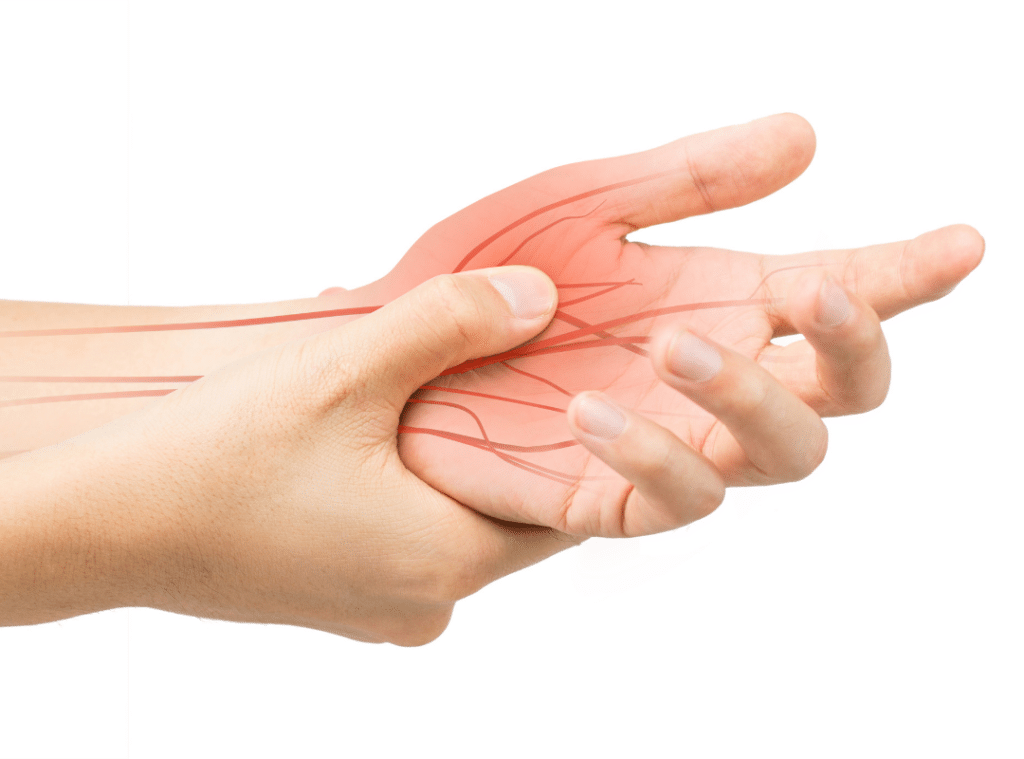Experiencing nerve damage in the hand can be life-altering—affecting everything from your grip strength to your ability to perform everyday tasks. Whether it’s caused by repetitive motion, an underlying condition like diabetes, or sudden trauma, early action is essential to prevent long-term consequences.
If you’re wondering how to treat nerve damage in the hand, the good news is that your body has a remarkable capacity to heal—especially when supported with the right nutrients and habits. This article explores key vitamins, lifestyle shifts, and when to seek professional help so you can regain function and comfort in your hand and arm.
For personalized guidance on recovery and healthy living, visit Westmont of Cypress, where your well-being always comes first.
Understanding Nerve Damage in the Hand
Dealing with nerve damage in the hand and arm often starts with subtle symptoms like numbness, tingling, or reduced grip strength. But these signs can quickly escalate if left untreated. Common causes include:
- Repetitive stress (e.g., typing or manual labor)
- Carpal tunnel syndrome
- Traumatic injury
- Diabetes or autoimmune diseases
Early detection is key. Understanding what are the signs of nerve damage in your hands helps you recognize the issue before it becomes severe. These signs often include:
- Tingling or burning sensations
- Numbness in fingers or palm
- Muscle weakness or twitching
- Increased clumsiness or dropping objects
If you recognize any of these, prioritize early care and consider the role of nutrition in nerve repair. For added support, check out our guide on good nutrition for older adults.
The Role of Vitamins in Nerve Health
One of the most effective natural ways to heal nerve damage in the hand is through targeted nutrition. Specific vitamins have been shown to support nerve regeneration and reduce inflammation. These include:
- Vitamin B12: Promotes myelin sheath production (the nerve’s protective layer)
- Vitamin B6: Supports neurotransmitter activity
- Vitamin E: A powerful antioxidant that shields nerves from damage
- Folic Acid: Essential for cell regeneration and DNA repair
These nutrients help rebuild nerve tissue and restore normal function over time. They also serve as a foundation for your overall health.
For more on how vitamins affect the body, explore this resource on vitamins for strong bones and joints.
Essential Vitamins for Nerve Repair
Healing from nerve damage in the hand isn’t instant—but the right nutrients can accelerate the process. Here’s how each plays a role in recovery:
🔹 Vitamin B12
Vital for nerve cell function and regeneration. A deficiency in B12 is often linked to nerve damage in the hand and arm, making supplementation crucial.
🔹 Vitamin B6
Supports communication between nerves. However, too much can be harmful—so stick to safe levels through food or a healthcare-approved supplement.
🔹 Vitamin E
Fights oxidative stress, which is a major contributor to long-term nerve deterioration. Found in nuts, seeds, and green leafy vegetables.
🔹 Folic Acid
Encourages the creation of new cells. Especially helpful if your nerve damage stems from chronic conditions like diabetes.
For a holistic diet, combine these with fiber-rich foods that aid overall body function.

Lifestyle Changes to Support Recovery
In addition to nutritional support, modifying your environment and habits can greatly improve outcomes.
🧘 Stress Management
Chronic stress worsens inflammation, which slows nerve repair. Practices like meditation, deep breathing, or yoga can create a healing internal environment.
🧑💻 Ergonomic Adjustments
If your work involves typing or lifting, using wrist supports or modifying hand positions can reduce additional strain and help in how to treat nerve damage in the hand effectively.
🏃 Regular Physical Activity
Light exercise promotes blood circulation—delivering vitamins and oxygen to the affected areas. Learn more about safe routines from this guide to senior fitness.
When to Seek Medical Advice
Not all cases of nerve damage in the hand can be resolved through diet and lifestyle alone. It’s crucial to know when to see a professional.
Consult a doctor immediately if you experience:
- Persistent numbness or tingling
- Loss of coordination or grip
- Sudden weakness in the hand or wrist
- Pain that disrupts sleep
These could be signs of ulnar nerve damage in the hand, a condition requiring prompt medical evaluation. A healthcare provider may recommend tests such as:
- Nerve conduction studies
- MRI or ultrasound
- Blood tests for vitamin deficiencies
Your physician might suggest physical therapy, medications, or surgery, depending on severity. Remember, the earlier you act, the better the chances for full recovery.
Learn more about dietary support for nerve repair in this article on vitamin-rich foods for nerve health.

Tips for Long-Term Nerve Health
Once symptoms improve, you can continue to protect your nerves through:
- Daily multivitamin support
- Routine hand exercises to keep joints and muscles active
- Hydration to maintain optimal cell function
- Regular check-ups, especially if you live with chronic illnesses like diabetes or arthritis
Recovery is a journey—but with the right tools, improvement is achievable.
Ready to Take the Next Step Toward Healing?
Living with nerve damage in the hand doesn’t have to mean permanent discomfort or limitation. By focusing on healing nutrients, daily habits, and timely professional care, you can restore functionality and reduce pain.
Don’t wait to reclaim your comfort and confidence.
📞 Contact Westmont of Cypress today at 714-252-7144 or schedule a tour to learn how our wellness-focused environment supports your health goals. Our team is here to help you live fully—every step of the way.
How Do The Costs Of Moving Into A Quality Senior Care Community Compare With The Costs Of Staying At Home?Compare The Costs of Senior Living vs Staying at Home
Frequently Asked Questions
How do you treat nerve damage in the hand?
Treatment for nerve damage in the hand depends on the severity and cause of the injury. Mild cases may improve with rest, physical therapy, and anti-inflammatory medications to reduce pain and swelling. In some situations, splints or braces help support proper hand function during healing. Severe cases may require surgery or specialized therapies to restore nerve function and improve mobility.
What are the signs of nerve damage in your hand?
Common signs of nerve damage in the hand include tingling, numbness, or a “pins and needles” sensation. Some people may also experience weakness, difficulty gripping objects, or a loss of finger coordination. Sharp or burning pain can be another indicator of nerve-related issues. Over time, untreated nerve damage may lead to muscle wasting or reduced hand strength.
Can you still use your hand if you have nerve damage?
Yes, you can often still use your hand with nerve damage, but the function may be limited depending on the severity. Mild nerve issues might only cause temporary tingling or weakness without fully restricting use. More advanced damage may interfere with gripping, lifting, or fine motor skills. Early diagnosis and treatment can significantly improve the chances of maintaining hand function.
What are the first symptoms of nerve damage?
The first symptoms of nerve damage typically include tingling, numbness, or a burning sensation in the affected area. Some people also experience increased sensitivity to touch or temperature changes. In the hand, early signs may make it more difficult to perform tasks such as buttoning clothes or holding small objects. Recognizing these symptoms early and seeking medical care can help prevent further complications.








